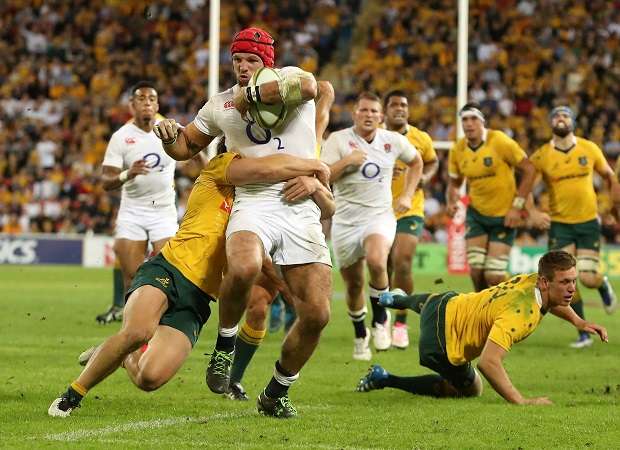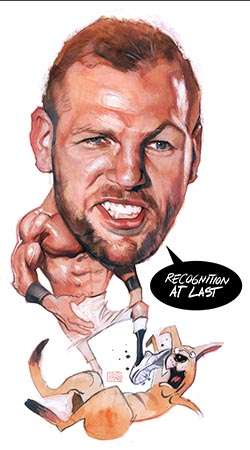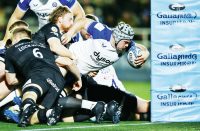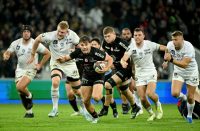 James Haskell is proof that you can’t keep a good man down. The sheer storm-force belligerence with which he bowled over the Wallabies, and then put his foot down to keep them pinned to the deck in Brisbane and Melbourne, had already made him England’s player of this ground-breaking series before the final thrilling instalment was played in Sydney.
James Haskell is proof that you can’t keep a good man down. The sheer storm-force belligerence with which he bowled over the Wallabies, and then put his foot down to keep them pinned to the deck in Brisbane and Melbourne, had already made him England’s player of this ground-breaking series before the final thrilling instalment was played in Sydney.
The Wasps man’s contribution to the series win was nothing short of immense, and had he not been ruled out of the third Test by a foot injury that limited him to striding around England’s base at Coogee in a protective ski-boot, there is no reason to believe it would not have continued and certainly made more of an impact that his replacement Teimana Harrison.
If Haskell was good during the Six Nations Grand Slam, he took his game to new heights against Australia.
He has been driven by two factors. First a sense of injustice stemming from the feeling that, in his own words, he was England’s “dirty secret” during the Stuart Lancaster regime, and the second that he wants to repay Eddie Jones because he has been given the chance to prove he is a valuable asset.
You also knew that Haskell’s desire to play for England still burned strongly despite the 2015 World Cup no-show. After getting his first start in the dead-rubber against Uruguay in the last pool game he became involved in a social media spat with Lewis Moody when the former England captain – who played for England in the 2011 World Cup despite struggling with injury – suggested it was time to introduce new back-row talent.
Haskell’s frustration surfaced as he retorted: “Sorry Judas! I’m 30-years-old not 40. You kept playing when half your body was clinically dead.”
He was angry that a desire to improve that saw him leave the Premiership to play in France with Stade Francais, New Zealand with the Highlanders, as well as a stint in Japan, had not registered with Lancaster and his coaches, and that on his return to Wasps he was viewed with suspicion.
After the Grand Slam was clinched in Paris, he elaborated: “I have been involved with England for a long time and this is the first time I have come into that camp and felt confident, respected, and like I was of value to the squad. It is not one rule for one and one rule for someone else.”
Where Haskell’s extrovert personality was distrusted by Lancaster and company, resulting in few opportunities, Jones decision to embrace him has been rewarded by Haskell, now 31, playing the finest rugby of his career.
The first Test in Brisbane saw Haskell at his best, and he did it with a No.7 on his back.
 This chimed with his tongue-in-cheek decision to order two T-shirts with ‘6 1/2′ printed on the back for him and Chris Robshaw, as a riposte to those like myself who have said that neither of them is an openside.
This chimed with his tongue-in-cheek decision to order two T-shirts with ‘6 1/2′ printed on the back for him and Chris Robshaw, as a riposte to those like myself who have said that neither of them is an openside.
Fair enough. While he does not fit the template of the Test openside that I believe England should be looking for next, there is no denying his outstanding form and effectiveness. With it is the recognition that at 6ft 4ins and 18st 6lbs (118kg) he is a battleship of a man, made all the more formidable by his dedication to being in peak condition.
Those attributes are the perfect fit for a big blindside, rather than a rapid, scavenging, linking openside – such as the Wallabies have in David Pocock and Michael Hooper. That’s why when Jones arrived on the scene six months ago he said he considered Haskell only a “short-term” solution at 7.
I’m happy to admit that he’s been an excellent solution, and it’s a tribute to Haskell that he has turned that perception on its head.
In Brisbane he did Jones’ bidding by smashing everything that moved in a gold jersey, starting with a crunching hit on Pocock. It was the first of 18 tackles by Haskell, which was twice as many as any other player on the pitch.
That wasn’t the end of it. He was constructive as well as destructive, linking for Jack Nowell’s late try, winning three turn-overs, and making two clean breaks.
The most significant of these was when Haskell charged from a driving maul and wrong-footed the Wallaby cover with a text-book sidestep to set up Marland Yarde’s try.
It also showcased the speed that has always been bubbling under, because anyone who saw his length of the field break for Wasps against Leicester in the 2007 European Cup final knew he was no slouch.
However, what Jones likes most is Haskell’s bullish feel-no-pain commitment. Jones cajoles the other Red Rose men to finish matches bloodied but unbowed “just like Haskell” – and the hit-man was in his element in Melbourne.
Whenever England’s last stockade looked in danger of falling it was the burly figure in the red scrum cap who was constantly the rallying point, making a remarkable 21 tackles to repel one Wallaby attack after another.
When he was eventually benched with nine minutes remaining Haskell was so sore and spent, as well as lame from the foot injury, that walking was an effort, let alone running.
Yet, he forced his protesting joints into a last painful jog to the touchline. Job done.
This week, although sidelined, he appears to have lost none of his energy.
The self-styled ‘Archbishop of Banterbury’ has done player-cam interviews with England team-mates like Billy Vunipola, as well as taken the time to send a message of encouragement, via Sky, to the England U20s ahead of their junior world championship final against Ireland.
Haskell has never been shy of self-promotion, but, in an often bland professional landscape he is a breath of fresh air.
Too many Premiership players have failed to register that they have an important role in interfacing with the media because it is the oxygen of publicity that promotes the sport, that, in turn, helps to pay their wages.
It also provides a link between the pro elite and those who support the game at all levels.
His high profile on social media has sometimes backfired, but this comment after the Brisbane game provided an insight into what really matters to Haskell.
After a quip – “this is a bit disconcerting because everyone’s being nice to me” – he paid this tribute to Jones:
“He treats all the boys very fairly – he knows how to talk to me, to get the best out of me. He’s empowered me, given me an opportunity, a role in the team.
“Some people need a bit of a stick, some a carrot. I’m more of a carrot man really.”
Well done the Carrot Man.























